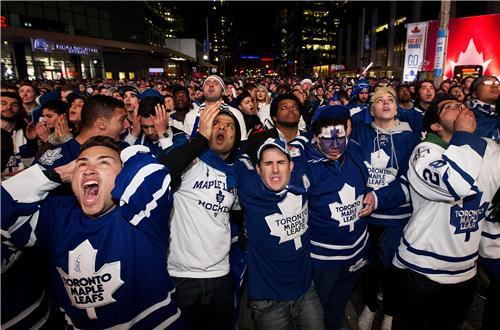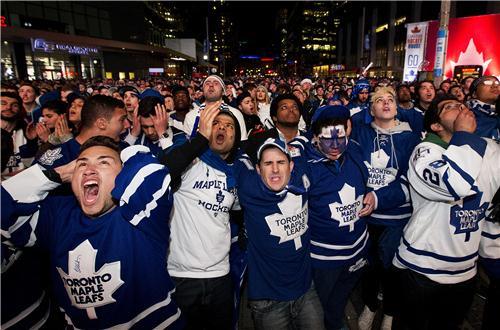The other day I was talking to my Mom about the post I wrote following the United States’ loss to Canada in the Olympic Men’s Ice Hockey semi-finals. She complimented me (thanks Mom!) on how well I expressed the emotions of a fan who has just watched their team lose. Our conversation led into a discussion of why it seems like fans take losses harder than the athletes themselves. I decided to turn that conversation into this short essay on why sports fans care more than the players.

The day before the U.S. vs. Canada game, I had the opportunity to hang out in the USA house in Olympic Park. There I met the mother of an Olympic Snowboard Cross competitor. When I asked her how he did, she grimaced and said “Not so good.” I commiserated with her and when it was clear that she hadn’t let the loss get in the way of her enjoying the Olympic experience, I asked her if her son was able to enjoy himself after the loss too. Of course he was, was her answer. She explained that he usually takes fifteen minutes to a half-hour to get over a bad performance and that she and her family have learned to give him space until he’s done processing. By the time another American racer had won the competition, her son was already able to enjoy it with him, grinning and lifting him up in celebration.
At the depths of my despair about the fate of the United States Men’s Ice Hockey team, I felt as though I had come thousands of miles for nothing — just to see them lose. But then I thought of this woman and her son. If he was able to get over his loss, which he had traveled thousands of miles for, not to mention the thousands of hours of training, then certainly I should be able to get over my feelings of loss. That’s when my Mom mentioned that when my brother and I were kids and our soccer teams lost, she was always more upset, for longer, than he or I was. She said that our behavior was a lot like the snowboarder’s — by the time we got home from the game, it seemed like we had moved on.
Why is that, we wondered? Why do sports fans care more than the players?
The common answer to this common question, usually asked about professional athletes, is that they care less than the fans because it’s a job for them while it’s a passion for the fans. There’s probably some truth to this. There have been lots of stories in the past year that clarify that locker rooms are workplaces and being an athlete is a job. The Jonathan Martin, Richie Incognito story was about workplace harassment. The brain injury story has been about assumptions of safety and fair disclosure of risk in the workplace. The Michael Sam and Jason Collins story has been about freedom of preference expression in the workplace. Meanwhile, players are being traded and cut by their teams left and right, each one clarifying that athletes are hires, not members of a team family. I’m suspicious of the logic that adds all of this evidence together and comes out with the conclusion that this is why professional athletes don’t seem to care about losses as much as fans. First of all, if this were true, then we wouldn’t expect to see fans of youth or amateur sports care more than the players. Secondly, the selection process to make it into a professional league in a team sport is so competitive that I think it selects for people who care more about the team than most rational people would.
My explanation is that fans care more than the players because they have less agency. Another thing I did on my trip was read a lot. My girlfriend (this is turning into quite a family post!) recommended The Regeneration Trilogy by Pat Barker. In it, a psychologist treats victims of what they called “shell-shock” or “hysteria” during World War 1 and, despite mixed feelings on the matter, tries to cure them so they can go back to the front. Dr. William Rivers (who was a real person — much of the books is based on his and some of his patients’ writings which have survived) uses his few free hours to theorize about the nature of the psychological disorders that he’s working on. He theorizes that the connection between the common incidence of shell-shock among men at the front and the hysteria that during peace-time was a more common female issue, is lack of agency. He doesn’t think that what pushes soldiers or house-wives over the edge is the horror of war or an abusive husband but instead it’s the feeling of being completely invested in something that you have absolutely no power to influence in any material way.
The same, do a much lesser extent, of course, is true of sports fans. We sit in the stands or on our couches and invest ourselves in the success or failure of our teams but we have absolutely no control over what happens to them. As much as we try with lucky jerseys, lucky food, or other rituals, we know that we’re just observers and not a part of the action. My guess is that that is psychologically harder than what the athletes go through during most losses. At least they impacted the game — even if they kick themselves for a bad catch or an errant pass or a missed defensive assignment, they know that they did some good things and some bad ones; they know they had an effect on the game. The athlete who loses doesn’t feel the helpless meaningless feeling of the fan who knows that she cares so deeply about something completely uncontrollable… and that she’s going to continue to next season.

